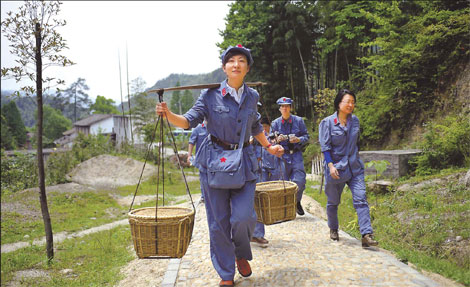Drawing strength and inspiration from history
 0 Comment(s)
0 Comment(s) Print
Print E-mail
China Daily, June 29, 2011
E-mail
China Daily, June 29, 2011
In Yan'an, the cradle of the Chinese revolution, officials turn into attentive students when they attend the training courses organized by the China Executive Leadership Academy, Yan'an (CELAY), a key training school established by Communist Party of China (CPC) six years ago.
 |
|
Trainees at Jinggangshan Party Members and Cadres Training Center in East China's Jiangxi province get an experience of Red Army life by carrying grain on April 29. Qian Yi / Xinhua |
Sitting on small portable folding chairs, they are instructed to review the bygone glorious "red days" at important historical sites, such as Yangjialing village, where Mao Zedong famously announced "all reactionaries are paper-tigers" to the US journalist Anna Louise Strong; the Date Garden, where the Secretariat of the Central Committee of CPC operated; and the Precious Pagoda which is regarded as the symbol of the Chinese revolution.
"Such on-site courses present lectures vividly," says trainee Wang Xin, secretary of the discipline inspection commission at the Beijing-based National Prosecutors College of China, who was participating in a 10-day training program that started on June 15.
"When I sit by the old trees and in the old cave dwellings, I remember the older generation of communists and how they persisted in fighting despite their hardships and it strikes a deep chord in my heart," he said.
Wang, born in the 1950s, said that a classmate, who was born in the 1970s, told him reviewing history in the places where it took place helps improve moral cultivation and shed light on working methods, such as how to maintain a close relationship with the people.
"We Party members should serve the interests of the people. But under the market economy situation, some officials abuse their powers for personal gain and violate laws. That's something a disciplinary official, like me, doesn't want to see," he said.
Wang is just one of the hundreds of officials, executives and military officers receiving training at CELAY to enhance their capabilities as Party cadres.
Staying in 10-square-meter rooms and eating simple meals, cadres are required by the school regulations to study without the help of secretaries and write their essays by themselves. More importantly, they are asked to "purify their souls" and "find mind-changing revelations" during their study in the place where their predecessors persevered for 13 years despite significant hardships.
Yan'an marked the end of the Long March in 1935. Over the next 13 years, the CPC leaders, including Mao Zedong, Zhou Enlai and Zhu De, who at times resided in simple cave dwellings, led the Chinese people to victory in the War of Resistance against Japanese Aggression (1937-1945) and the civil war against the Kuomintang.
Party members have always considered Yan'an as their spiritual home.
By virtue of the city's abundant historic revolutionary resources, CELAY was founded in 2005 by the CPC in a bid to reinforce officials' belief in Communism and enhance their working abilities by looking back on history. More than 28,000 officials have been trained so far.
In the same year, two other academies in Shanghai and Jinggangshan, in East China's Jiangxi province, were also established.
In the current era, officials need to strengthen the awareness of clean governance, enhance their collaborative and innovative abilities and learn skills so they can tackle events in a timely manner, says Chen Yannan, vice-president of CELAY.
He adds it is even more important for younger-generation officials to re-experience the history of the CPC, but he admits putting the knowledge learned from the courses into practice is a challenge for officials as tutors can only inspire them by analyzing historic and current events.
Besides on-site and theoretical courses, local yangge dance and folk songs are also incorporated into the courses as "passion education".
Chen Yingxian, deputy director-general of bureau of culture and science of the Ministry of Culture, says when she hears the music, she thinks about the senior communists who were devoted, or are still devoting, their lives to China.
She recalls one time she has the chance to sweep the tomb of Lu Yao (1949-1992), a contemporary Chinese writer, in Yan'an University.
"There is a line carved on his gravestone that reads: 'To work hard like an ox and be dedicated like the soil', that's the spirit of Yan'an," says Chen.
She says her son is envious of her generation, as "although we had nothing during the hard days, we always had an upbeat spirit".
"Party members should bear the historical memories, as all precious traditions and experience of the Party are formed in the process of its development," says Lu Weidong, director of the publicity department of the Party committee at Northwest A&F University in the province and also a part-time tutor at the CELAY.
"Without drawing strength and inspiration from history, our spirit in the new era would be like water without a source and a tree without roots."






Go to Forum >>0 Comment(s)